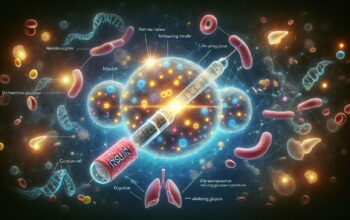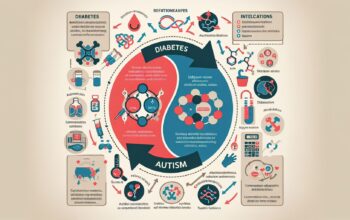Diabetes affects at least 422 million people worldwide, according to the World Health Organization. In the United States, around 1.5 million new cases are diagnosed each year. Meanwhile, the rate of children diagnosed with Autism Spectrum Disorder (ASD) is also on the rise, with around 1 in 54 children identified each year. While these two conditions may seem unrelated, recent studies have started to investigate a potential link between diabetes and autism. This blog post will delve into this fascinating topic, offering insights into the reasons for this possible connection, its implications, and how understanding it could help us manage two of the most common health challenges today.
Unraveling the Diabetes-Autism Connection
Researchers have been exploring the connection between maternal diabetes, both gestational and type 2, and an increased risk of autism in offspring. Several large, well-conducted studies support this association.
Gestational Diabetes and ASD
One study published in the Journal of the American Medical Association in 2015 observed more than 320,000 children born in Southern California between 1995 and 2009. The study noted that mothers who received a diagnosis of gestational diabetes by the 26th week of pregnancy were 63% more likely to have children diagnosed with autism than mothers without diabetes.
Type 2 Diabetes and ASD
On the other hand, it’s not just gestational diabetes that seems to have an association. Type 2 diabetes in mothers has also been linked to an increased risk of autism in children. A study published in Pediatrics in 2018 studied more than 419,000 children and found that those born to mothers with type 1 diabetes had a higher chance of being diagnosed with autism.
Possible Explanations for the Connection
The exact reasons for the link between diabetes and autism are not yet entirely clear. However, researchers believe it may be due to a combination of genetic and environmental factors.
Insulin Resistance and the Brain
Researchers believe that high blood sugar levels during pregnancy may contribute to autism risk by affecting the developing brain. High levels of glucose and insulin in the mother’s bloodstream could potentially alter the baby’s brain development.
Immune System Response
Another possible explanation is that the body’s immune response to diabetes may play a role. Diabetes is associated with inflammation and an altered immune response, both of which could potentially impact fetal brain development.
Furthermore, genetics could play a crucial role. People with certain genetic dispositions may be more likely to both develop diabetes and give birth to children with autism.
Implications and Future Research Directions
The link between diabetes and autism is essential for several reasons. Firstly, it helps us understand the causes of autism, a condition whose origin has so far been elusive. Secondly, it could help us identify children at a higher risk of autism, thus enabling early intervention strategies.
However, while these findings are significant, it is crucial to remember correlation does not imply causation. More research is needed to make sense of these complex relationships. In the future, we may see more studies into the genetic and environmental factors that may cause both conditions. These studies could lead to better prevention and treatment strategies for both diabetes and autism.
Managing the Risk
Even though more research is still needed, this discovery has potential implications for reducing the risk of autism. If you’re pregnant and have diabetes, it doesn’t mean your child will automatically be autistic. But it’s essential to manage your diabetes as best as possible during pregnancy.
Regular check-ups with the doctor, good nutrition, physical activity, and monitoring blood glucose levels are all valuable. Doing so will not only help manage diabetes but may also reduce the potential risk of autism in children.
Furthermore, pregnant women with diabetes should consult their healthcare providers about this research and what it may mean for their pregnancies. In addition, health professionals should consider screening children of mothers with diabetes for ASD to ensure early diagnosis and treatment.
Conclusion
The link between diabetes and autism is a growing area of scientific investigation. While this post has explored the research and possible reasons behind this association, science is continually evolving, and this understanding may change as more studies are conducted. Nonetheless, the current findings underscore the importance of excellent prenatal care for all women, particularly those with diabetes, as we strive towards minimizing the risk for conditions during fetal development, including ASD. Meanwhile, they also highlight the importance of ongoing autism research and the potential benefits that could arise as we continue to illuminate the intricate workings of the human mind.




